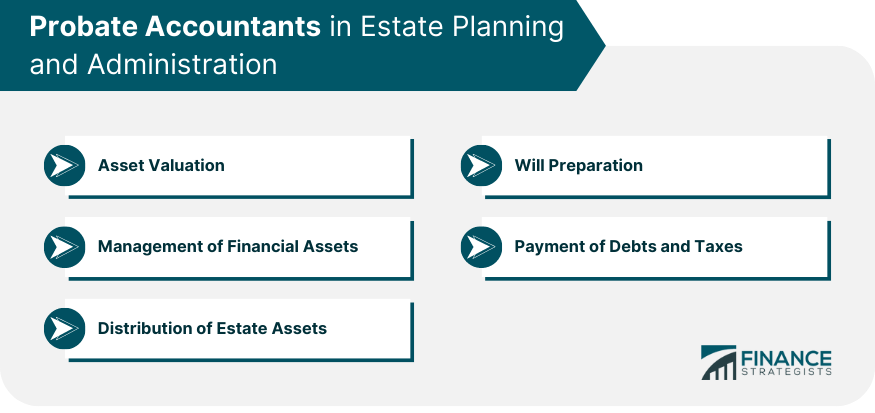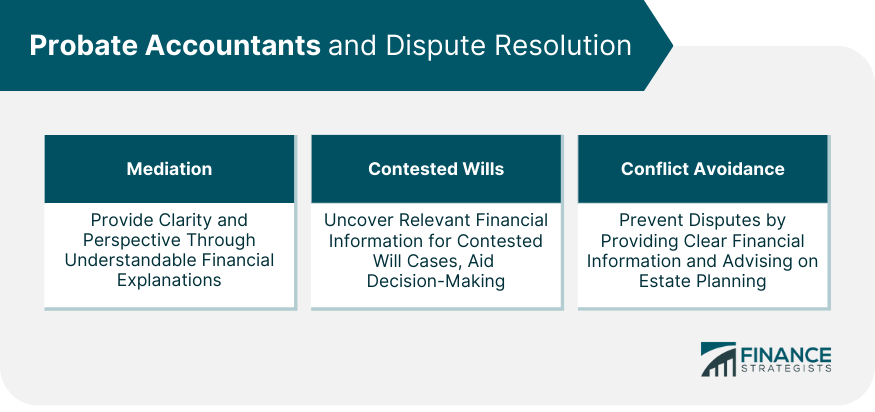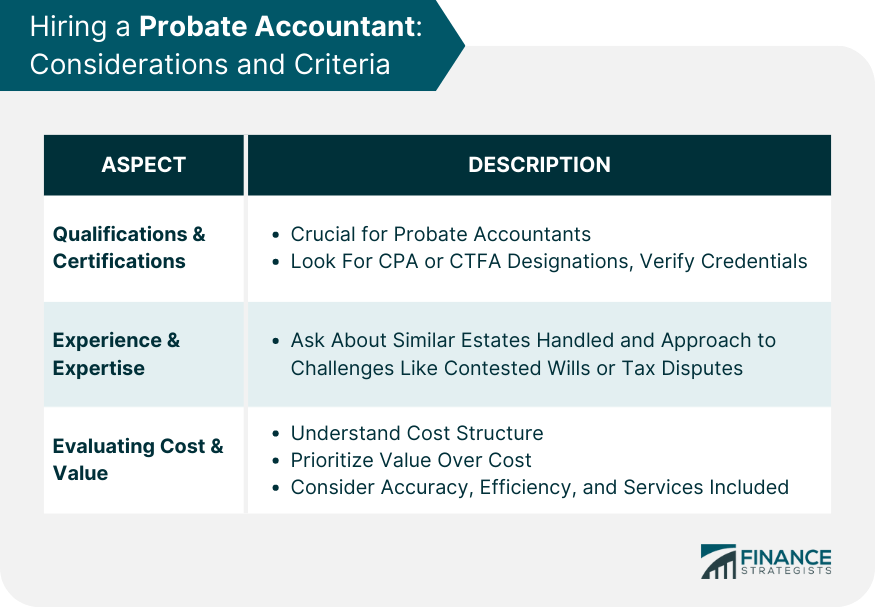Probate accountants are specialized financial professionals who oversee and administer the distribution of a deceased person's estate during the probate process. They are experts in navigating the complexities of estate administration and tax law, ensuring that the financial affairs of the deceased are properly settled. The executor is typically the one who engages a probate accountant to ensure that the estate's financial affairs are managed accurately and efficiently. Probate accountants play a vital role in this process, handling responsibilities such as estate valuation, tax filings, debt settlement, and asset distribution. They also provide advice to the executor on matters related to estate taxes and other financial implications of the probate process. One of the first steps in the probate process is to ascertain the estate's total value. Probate accountants excel in this area, providing accurate and comprehensive valuations of all assets within an estate. This includes everything from real estate, investments, and business interests, to personal belongings. Probate accountants use various techniques to appraise these assets, considering market value, depreciation, and other factors to provide a fair and accurate valuation. While probate accountants typically become involved after a person's death, they can also play a valuable role in the planning stages. They can assist in drafting wills, providing advice on how to structure the estate to minimize taxes and potential disputes among beneficiaries. After the executor or personal representative of the estate has been appointed, the probate accountant steps in to assist with financial management. This involves maintaining and managing financial accounts, paying ongoing bills and debts, and preparing the estate for distribution to the beneficiaries. This complex task demands a high level of financial acumen and a deep understanding of estate law. Probate accountants play a critical role in identifying, quantifying, and paying off the decedent's debts. They also ensure that all tax liabilities, including income tax, inheritance tax, and estate tax, are accurately calculated and paid within the required timeframes. Through their comprehensive understanding of tax law, probate accountants can help avoid penalties and interest associated with late or incorrect tax payments. Once debts and taxes are paid, the probate accountant assists in distributing the remaining assets according to the terms of the will or state law if no will exists. They ensure that each beneficiary receives their due share, taking into account any specific bequests or provisions within the will. Compliance includes filing all necessary documents with the probate court, meeting tax filing and payment deadlines, and adhering to all laws pertaining to the distribution of estate assets. Probate accountants often coordinate with the probate court, presenting financial documents, responding to inquiries, and addressing any financial issues that arise during the probate process. Active interaction ensures that the probate process proceeds smoothly and that any potential financial complications are promptly addressed. Probate fraud is a serious concern that can cause significant problems for an estate. Probate accountants play a crucial role in preventing such fraud, identifying and addressing any irregularities, and ensuring that all financial dealings are conducted honestly and transparently. Probate accountants provide vital expertise in this area, advising the executor on strategies to minimize these taxes and ensure they are correctly calculated and paid. They understand the intricacies of estate and inheritance tax laws and can provide guidance to avoid penalties and maximize the value of the estate passed on to the beneficiaries. Probate accountants are also responsible for preparing and filing the decedent's final income tax return and any necessary estate tax returns. They review all financial records to identify taxable income and allowable deductions, calculate the tax liability, and ensure that all tax returns are filed on time and accurately. Probate accountants can guide the executor on steps such as distributing assets during the decedent's lifetime, creating trusts, or making charitable donations to reduce the estate's overall tax burden. Probate accountants go beyond crunching numbers. They are capable of providing clarity and perspective to all parties involved by explaining complex financial information in a way that's understandable. Through mediation, probate accountants can assist in finding common ground among disputing parties, helping them understand the financial implications of their demands or the reasons behind certain distributions. Their clear, neutral advice can be invaluable in fostering understanding and consensus among beneficiaries, leading to the resolution of disputes without resorting to legal action. They can serve as a disinterested third party, focused solely on the fair and accurate distribution of the estate. Contesting a will is a complex process that can quickly escalate into a lengthy legal battle. As financial detectives, probate accountants are capable of diving deep into the decedent's financial history to uncover relevant information that can be essential to the case. Their expertise can aid in understanding the financial realities that shaped the decedent's will, and they can prepare detailed reports to clarify these facts for the court. If required, probate accountants can also testify as expert witnesses, offering an objective perspective that supports the court in making informed decisions. By providing clear, accurate, and comprehensive financial information, they can eliminate misunderstandings that may lead to disputes among beneficiaries. This can involve explaining the valuation methods used for different assets, the tax implications of the estate distribution, and the reasons behind the allocation of certain debts or expenses. Moreover, probate accountants can advise on estate planning strategies that minimize potential disputes. For example, they may suggest ways to structure an estate that evenly distributes assets or fulfills the decedent's wishes in a way that is least likely to be contested. The realm of probate accounting demands a sophisticated understanding of estate laws, tax regulations, and financial management. A probate accountant with robust qualifications and certifications is likely to possess the requisite knowledge and skills to handle such complexity. For instance, a Certified Public Accountant (CPA) has undergone rigorous training and passed a comprehensive exam that covers wide-ranging aspects of accounting, law, and business. A CPA who specializes in probate and estate accounting can provide robust guidance during the administration of an estate. Another pertinent certification is the Certified Trust and Financial Advisor (CTFA). A professional with a CTFA designation has demonstrated expertise in personal trusts and estate planning and offers a high level of proficiency in these areas. When engaging a probate accountant, make sure to verify their credentials. It's also worth checking whether they are a member of professional bodies like the American Institute of Certified Public Accountants (AICPA), which often have strict ethical guidelines for members. Ask about the types of estates they have handled. Have they worked with estates of similar size and complexity to the one you are dealing with? How do they approach challenges such as contested wills or tax disputes? In addition, consider the accountant's area of expertise. While some accountants may offer probate services, they might primarily specialize in other areas, such as corporate tax or financial planning. An accountant who specializes in probate and estate administration is likely to be more adept at managing the specific nuances of the probate process. Probate accountants typically charge based on the time spent, the complexity of the work, or a percentage of the estate value. However, fees can vary significantly, and it's essential to have a clear understanding of the cost structure upfront. While cost is an important consideration, it should not be the sole deciding factor. The value a proficient probate accountant brings—accuracy, efficiency, reduced risk of legal issues, and overall peace of mind—can far outweigh the cost. It's often a case of "you get what you pay for." When comparing costs, be clear about what services are included. Does the fee cover only the probate process, or does it also include pre-probate planning and post-probate support? By understanding these aspects, you can assess the true value of the services provided. Probate accountants are essential professionals who play a crucial role in managing the financial affairs of a deceased person's estate during the probate process. Their expertise in estate administration, tax law, and financial management ensures accurate valuation of assets, proper settlement of debts and taxes, and fair distribution of the estate. They ensure compliance with all laws, prevent probate fraud, and interact with the court system. Additionally, probate accountants provide valuable guidance in estate and inheritance tax matters, assist in dispute resolution among beneficiaries, and can aid in contested wills and estates by providing detailed financial reports and serving as expert witnesses. When considering hiring a probate accountant, it is important to evaluate their qualifications, certifications, and relevant experience in handling estates similar to yours. While cost is a consideration, it should not overshadow the value that a proficient probate accountant brings in terms of accuracy, efficiency, and peace of mind. By engaging their services, you ensure the proper settlement of financial affairs, fair distribution of assets, and minimize potential legal disputes, ultimately achieving a smooth and successful probate process.What Are Probate Accountants?
Probate Accountants in Estate Planning and Administration
Asset Valuation
Will Preparation
Management of Financial Assets
Payment of Debts and Taxes
Distribution of Estate Assets

Legal Responsibilities of Probate Accountants
Compliance With Local and State Laws
Interaction With the Court System
Understanding and Avoiding Probate Fraud
Taxation Concerns and Probate Accountants
Estate and Inheritance Taxes
Tax Returns
Tax Minimization Strategies
Probate Accountants and Dispute Resolution
Mediation
Contested Wills and Estates
Conflict Avoidance

Hiring a Probate Accountant: Considerations and Criteria
Qualifications and Certifications
Experience and Expertise
Evaluating Cost and Value

Final Thoughts
Probate Accountants FAQs
A probate accountant is a specialized financial professional who handles the financial affairs of a deceased person's estate during the probate process. They are experts in estate administration, tax law, and financial management.
Probate accountants perform various tasks, including asset valuation, tax filings, debt settlement, and asset distribution. They also provide advice to the executor on estate taxes and other financial implications of the probate process.
It is advisable to engage a probate accountant as soon as possible after the death of the individual. They can assist with the valuation of assets, financial management, and ensure compliance with tax and legal requirements throughout the probate process.
Yes, probate accountants can play a role in dispute resolution among beneficiaries. They can provide clarity on financial matters, explain asset valuation methods, tax implications, and help find common ground. Their objective perspective can facilitate understanding and consensus.
When choosing a probate accountant, consider their qualifications, certifications, and relevant experience in handling estates similar to yours. Look for specialization in probate and estate administration. Additionally, consider the cost structure and services provided to assess the value they bring to the probate process.
True Tamplin is a published author, public speaker, CEO of UpDigital, and founder of Finance Strategists.
True is a Certified Educator in Personal Finance (CEPF®), author of The Handy Financial Ratios Guide, a member of the Society for Advancing Business Editing and Writing, contributes to his financial education site, Finance Strategists, and has spoken to various financial communities such as the CFA Institute, as well as university students like his Alma mater, Biola University, where he received a bachelor of science in business and data analytics.
To learn more about True, visit his personal website or view his author profiles on Amazon, Nasdaq and Forbes.















